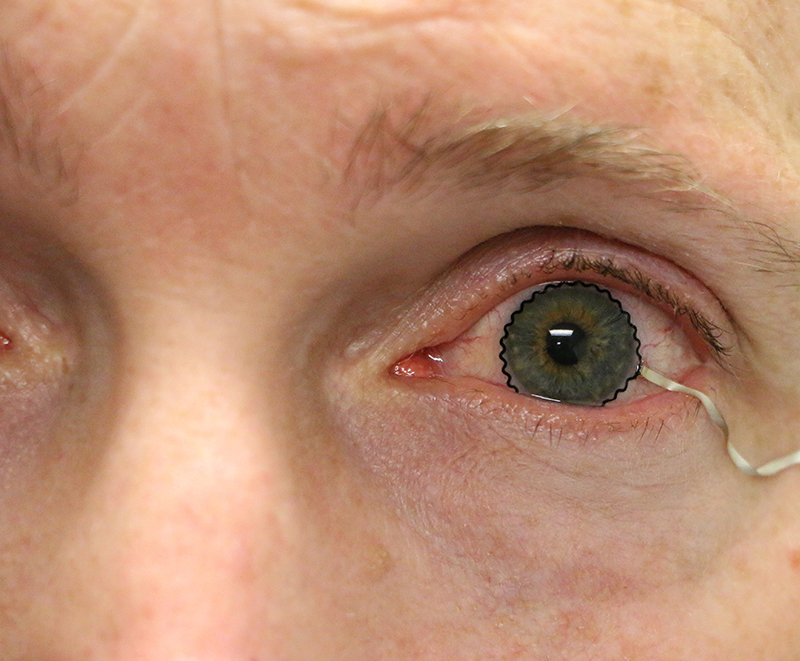March 10, 2021
Soft contact lenses eyed as new solutions to monitor ocular diseases

New contact lens technology to help diagnose and monitor medical conditions may soon be ready for clinical trials. (Image provided by Pete Kollbaum)
WEST LAFAYETTE, Ind. – New contact lens technology to help diagnose and monitor medical conditions may soon be ready for clinical trials.
A team of researchers from Purdue University worked with biomedical, mechanical and chemical engineers, along with clinicians, to develop the novel technology. The team enabled commercial soft contact lenses to be a bioinstrumentation tool for unobtrusive monitoring of clinically important information associated with underlying ocular health conditions.
The team’s work is published in Nature Communications. The Purdue Research Foundation Office of Technology Commercialization helped secure a patent for the technology, and it is available for licensing.
“This technology will be greatly beneficial to the painless diagnosis or early detection of many ocular diseases including glaucoma,” said Chi Hwan Lee, Purdue’s Leslie A. Geddes assistant professor of biomedical engineering and assistant professor of mechanical engineering, who is leading the development team. “Since the first conceptual invention by Leonardo da Vinci, there has been a great desire to utilize contact lenses for eye-wearable biomedical platforms.”
Sensors or other electronics previously couldn’t be used for commercial soft contact lenses because the fabrication technology required a rigid, planar surface incompatible with the soft, curved shape of a contact lens.
The team has paved a unique way that enables the seamless integration of ultrathin, stretchable biosensors with commercial soft contact lenses via wet adhesive bonding. The biosensors embedded on the soft contact lenses record electrophysiological retinal activity from the corneal surface of human eyes, without the need of topical anesthesia that has been required in current clinical settings for pain management and safety.
“This technology will allow doctors and scientists to better understand spontaneous retinal activity with significantly improved accuracy, reliability and user comfort,” said Pete Kollbaum, director of the Borish Center for Ophthalmic Research and an associate professor of optometry at Indiana University, who is leading clinical trials.
The other members of the team are Bryan Boudouris, a professor of chemical engineering from Purdue, and Baoxing Xu, an associate professor of mechanical and aerospace engineering from the University of Virginia.
This work is funded by the National Science Foundation (NSF CMMI-1928784 & 1928788) and the Air Force Office of Scientific Research (AFOSR FA9550-19-1-0271). For more information about licensing opportunities, contact Patrick Finnerty of OTC at pwfinnery@prf.org.
About Purdue Research Foundation Office of Technology Commercialization
The Purdue Research Foundation Office of Technology Commercialization operates one of the most comprehensive technology transfer programs among leading research universities in the U.S. Services provided by this office support the economic development initiatives of Purdue University and benefit the university's academic activities through commercializing, licensing and protecting Purdue intellectual property. The office recently moved into the Convergence Center for Innovation and Collaboration in Discovery Park District, adjacent to the Purdue campus. In fiscal year 2020, the office reported 148 deals finalized with 225 technologies signed, 408 disclosures received and 180 issued U.S. patents. The office is managed by the Purdue Research Foundation, which received the 2019 Innovation and Economic Prosperity Universities Award for Place from the Association of Public and Land-grant Universities. In 2020, IPWatchdog Institute ranked Purdue third nationally in startup creation and in the top 20 for patents. The Purdue Research Foundation is a private, nonprofit foundation created to advance the mission of Purdue University. Contact otcip@prf.org for more information.
About Purdue University
Purdue University is a top public research institution developing practical solutions to today’s toughest challenges. Ranked the No. 5 Most Innovative University in the United States by U.S. News & World Report, Purdue delivers world-changing research and out-of-this-world discovery. Committed to hands-on and online, real-world learning, Purdue offers a transformative education to all. Committed to affordability and accessibility, Purdue has frozen tuition and most fees at 2012-13 levels, enabling more students than ever to graduate debt-free. See how Purdue never stops in the persistent pursuit of the next giant leap at purdue.edu.
Writer: Chris Adam, cladam@prf.org
Source: Chi Hwan Lee, lee2270@purdue.edu
ABSTRACT
All-printed stretchable corneal sensor on soft contact lenses for noninvasive and painless ocular electrodiagnosis
Kyunghun Kim, Ho Joong Kim, Haozhe Zhang, Woohyun Park, Dawn Meyer, Min Ku Kim, Bongjoong Kim, Heun Park, Baoxing Xu, Pete Kollbaum, Bryan W. Boudouris and Chi Hwan Lee
Electroretinogram examinations serve as routine clinical procedures in ophthalmology for the diagnosis and management of many ocular diseases. However, the rigid form factor of current corneal sensors produces a mismatch with the soft, curvilinear, and exceptionally sensitive human cornea, which typically requires the use of topical anesthesia and a speculum for pain management and safety. Here we report a design of an all-printed stretchable corneal sensor built on commercially available disposable soft contact lenses that can intimately and non-invasively interface with the corneal surface of human eyes. The corneal sensor is integrated with soft contact lenses via an electrochemical anchoring mechanism in a seamless manner that ensures its mechanical and chemical reliability. Thus, the resulting device enables the high-fidelity recording of full-field electroretinogram signals in human eyes without the need of topical anesthesia or a speculum. The device, superior to clinical standards in terms of signal quality and comfortability, is expected to address unmet clinical needs in the field of ocular electrodiagnosis.

